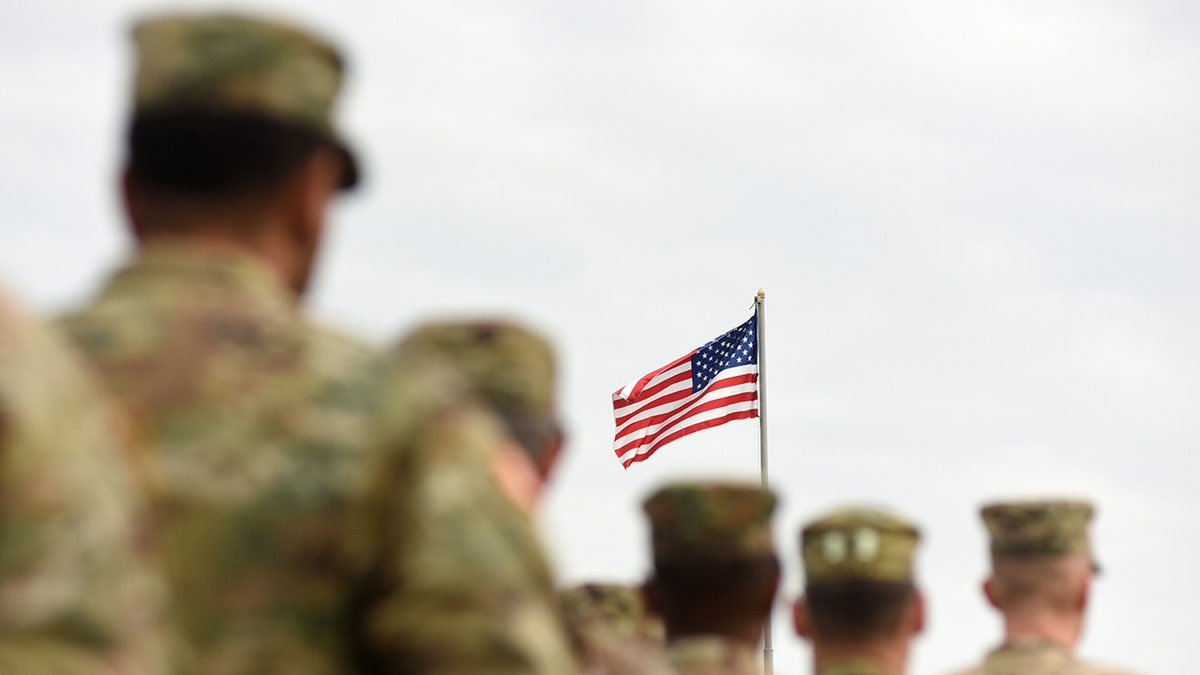Fox News Flash top headlines for June 22
Fox News Flash top headlines are here. Check out what's clicking on Foxnews.com.
A staggering 30,177 American active military personnel and veterans involved in post-9/11 wars are estimated to have died by suicide – a figure at least four times greater than the 7,057 service members who were killed in combat during that time, a new research paper says.
The statistics emerged this week in a report from the Cost of War Project – a joint research effort between Brown University and Boston University.
"Unless the U.S. government and U.S. society makes significant changes in the ways we manage the mental health crisis among our service members and veterans, suicide rates will continue to climb," the paper warns. "That is a cost of war we cannot accept."

American soldiers and the U.S. flag are pictured. A new research paper released this week highlights the number of suicides in the U.S. military (iStock)
NAVY EXPLOSION TEST FOR NEW AIRCRAFT CARRIER REGISTERS AS MINOR EARTHQUAKE IN FLORIDA
The paper says the "high suicide rates" are attributed to numerous factors, including "high exposure to trauma, stress, military culture and training, continued access to guns, and the difficulty of reintegrating into civilian life.
"In the post-9/11 era, the rise of improvised explosive devices (IED), the attendant rise in traumatic brain injuries (TBI), the war’s protracted length, advances in medical treatment that keep service members in the military longer, and the American public’s disinterest in the post-9/11 wars, have greatly contributed to increased suicide rates," it added.
Researcher Thomas Suitt, who authored the paper, highlighted the challenges Army Sgt. Dominic McDaniel faced during the Iraq War in the mid-2000s.
"When members of his squad – including the youngest member of his battalion – were wounded in combat, he felt immeasurable guilt," the paper says.
TUNNEL TO TOWERS ANNOUNCES CEREMONY TO COMMEMORATE SERVICE MEMBERS WHO DIED IN WAR ON TERROR
"A couple guys got hurt, and essentially I prayed, and I asked God for help," McDaniel was quoted as saying. "And at the end of that, I felt that no one was coming, and it was up to us. And that was a very alone, isolating feeling for sure, and I don’t know if that went away after that."
Following an IED explosion that gave McDaniel physical and mental wounds, he was forced to end his military career. He now works for a nonprofit helping other veterans who have experienced severe trauma – but 15 people from his unit ended up committing suicide after leaving service, compared to the nine from it that died in Iraq, the paper says.
"I isolated. I felt guilty because my guys got hurt, and I was in charge," McDaniel – who was battling alcohol abuse and divorce himself – was quoted as saying about his transition back to civilian life. "It was my fault. They started committing suicide when we got home pretty quick."
The paper concludes by saying that the U.S. military and Department of Veterans Affairs have spent a "tremendous amount of money" to tackle the rise in suicides, "yet the funding continues to climb even as suicide rates do not improve."
CLICK HERE TO GET THE FOX NEWS APP
"Ending the U.S.’s post-9/11 wars would be a good first step, but there are cultural changes that must occur as well," the paper adds. "The military needs to promote help-seeking attitudes and frame them positively."
"That polytraumas and repeated TBIs are so commonplace should motivate changes in if and how service members are redeployed," it says, while also noting that "the DoD, VA, and other actors should take moral injuries, military sexual trauma, and other traumas outside of the theater of war as seriously as physical wounds and more readily diagnose and respond to them."










































